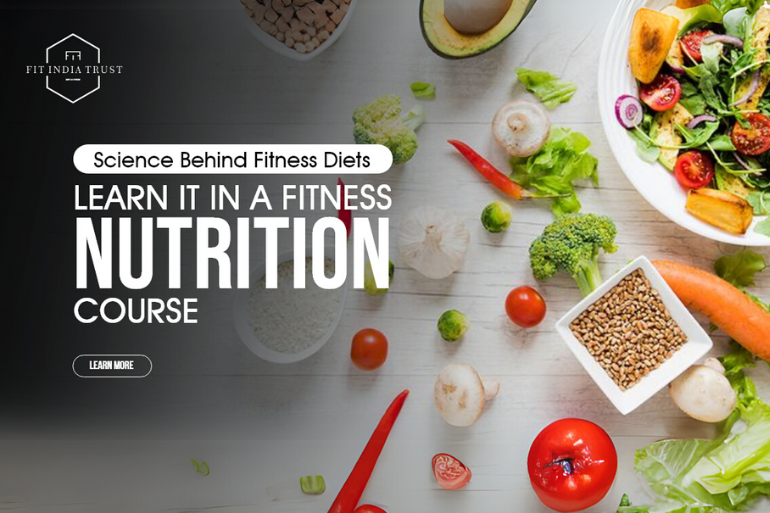
- info@fitindiatrust.org
- +91-7999567519

Science Behind Fitness Diets: Learn It in a Fitness Nutrition Course
The ability to understand how your body breaks down food and which diets lead to weight loss or muscle gain and endurance while explaining diet failure remains hidden from most people. By taking a fitness nutrition course, you can move past common diet myths to gain scientific evidence that will allow you to help your clients optimize nutrition for peak athletic performance and healthy lifestyle.
A 2024 survey revealed that 56.4% of the total diseases are attributed to unhealthy diets. The issue arises when numerous people follow nutrition diets without grasping the scientific foundation behind them.
This blog explores the scientific principles of fitness diets alongside the transformative power of proper education for your nutritional strategy.
The Science of Fitness Diets: Breaking Down the Basics
The key to understanding dietary success exists in the scientific field of nutrition as there is a key difference between a dietician and a nutritionist, which explains how your body handles macronutrients, micronutrients, and hydration. Learning about these fundamental elements in a fitness nutrition course allows you to help your client reach their maximum fitness potential. Let’s break it down.
Macronutrients
1. Protein
Protein consumption is essential for muscle growth, repair, and recovery. Without it, your workout will be fruitless. However, what is the right amount of protein to consume? According to fitness experts, active individuals need between 1.2 and 2.2 grams of protein per kilogram of body weight. Lean meats, eggs, dairy products, legumes, and plant-based sources such as tofu and quinoa meet the daily protein requirements.
2. Carbohydrates
Your body selects carbohydrates as its primary power source, particularly during intense physical activities. There are two types:
-
Simple Carbs: Consuming simple carbohydrates like sugar and white bread produces fast energy release through blood sugar spikes.
-
Complex Carbs: The energy release from complex carbs (oats, brown rice, and quinoa) lasts longer while maintaining stable blood sugar levels.
3. Fats
The belief that fats contribute to weight gain is false. The excess calories remain the actual reason for weight gain. The brain uses healthy fats to operate correctly while hormones stay regulated and your body maintains energy for extended periods.
-
Unsaturated fats such as nuts, seeds and avocados provide many heart health benefits.
-
Consuming omega-3 fats from fish, flaxseeds, and walnuts helps muscles recover and minimises inflammation.
-
People should limit their intake of saturated fats, primarily in butter and red meat.
Micronutrients
The body needs macronutrients to function, while micronutrients are required to achieve precise bodily operations that ensure all functions work optimally.
1. Vitamins
-
Vitamin D: Crucial for bone strength, immunity, and muscle function. Deficiency will cause physical exhaustion and reduced athletic abilities.
-
B-complex vitamin: The conversion of food into energy helps decrease fatigue while boosting endurance capabilities.
-
Vitamin C & E: Antioxidants that aid recovery and protect against exercise-induced oxidative stress.
2. Minerals
-
Iron is key for oxygen transport and avoids fatigue, which is essential for female athletes.
-
Zinc supports immune function and recovery.
A fitness nutrition course lets you determine the most effective methods for getting proper micronutrients from food and nutritional supplements based on your exercise activities.
3. Hydration
Dehydration can reduce athletic performance by up to 30%. The human body experiences fatigue and dizziness when body water declines by just 5% while endurance decreases simultaneously. Your muscles need electrolytes (as hydration levels depend on this nutrient, which also helps muscles contract while preventing cramps) in addition to water, to maintain efficient operation.
-
Hydrate 2–3 hours before exercise.
-
Sip water every 15–20 minutes.
-
After intense sweating, you should replace your fluids with water and electrolytes.
A fitness trainer course provides learners with advanced hydration techniques, including understanding the differences between isotonic drinks and plain water and adjusting hydration levels according to workout intensity.
How Different Diets Affect Fitness Goals
With a personal trainer course, you learn how various diets affect fitness levels, which can help you select the best nutritional approach for your fitness requirements.
Fat Loss Diets
Creating a caloric deficit through higher calorie expenditure than consumption is essential to losing body fat.
-
Keto Diet: Consuming very few carbohydrates and more fats allows your body to burn fat as fuel. Despite delivering practical results, high-intensity workouts become challenging to maintain on the keto diet.
-
Intermittent Fasting (IF): Determine your eating times instead of managing your food choices. The scientific evidence demonstrates that scheduled fasting helps people become more sensitive to insulin and leads to better fat burning.
-
Low-Carb Diet: These diets enable moderate carb consumption with protein and healthy fats as primary elements to maintain steady energy levels and promote fat reduction.
Muscle Gain and Strength Training Diets
Building muscles requires increased food consumption, proper nutrient quality, and strategic meal scheduling.
-
Protein Power: The recommended protein consumption for muscle growth is between 1.6 to 2.2 grams per kilogram of your body weight. The recovery and repair of muscles depends on high-quality protein sources, such as chicken, fish, eggs and plant-based proteins.
-
Protein Timing Matters: Studies show that spreading protein intake evenly throughout the day (rather than loading it all post-workout) leads to better muscle growth.
-
Carbs for Strength: Complex carbohydrates such as quinoa, sweet potatoes, and oats provide workout energy and recovery assistance for strength training.
Endurance Diets
This diet is perfect for athletes who run, cycle, or swim and who need to maintain a specific ratio of macronutrients to keep their energy levels and avoid muscle exhaustion.
Carb-Loading for Performance: Carb-Loading before endurance events fills their muscles with glycogen, serving as the body's primary fuel source for extended physical activity.
Balanced Macronutrients: Endurance diets differ from muscle-building diets. They need higher carbohydrate levels in comparison to protein to maintain athletic performance.
-
50–60% carbs for sustained energy.
-
15–20% protein to maintain muscle.
-
20–30% fats for long-term fuel.
Hydration is Critical: Electrolytes, such as the combination of sodium, potassium, and magnesium in the diet, stop muscle cramps and minimize fatigue.
A fitness nutrition course teaches athletes to create optimal endurance workout diets using carb cycling, hydration methods, and electrolyte management for peak performance.
Conclusion
Understanding fitness diet science enables people to make well-informed, sustainable dietary choices within the current environment of conflicting diet advice. The path to optimal fitness results depends heavily on proper nutrition, regardless of your fitness objectives, which include weight loss, muscle gain, endurance, or overall well-being.
Enroll in a fitness nutrition course today to gain evidence-based knowledge about macronutrients and metabolism, performance nutrition, and meal timing, which lets you create a diet plan that fits your client’s fitness needs and teach you the tips to keep your clients fit while getting older.
FAQs
1. How does a fitness nutrition course help in achieving fitness goals?
A fitness nutrition course provides evidence-based information on macronutrients, metabolism, meal planning, and performance nutrition. It enables you to make intelligent food choices based on your client’s fitness objectives such as weight loss, muscle building, or enhancing endurance.
2. Do all fitness diets suit all human beings?
Fitness diets must be carefully tailored to one's health, activity level, and objectives. A good fitness nutrition course allows you to learn the strategies to develop personalised meal plans which are tailored to the unique requirements of one's body.
3. What are some common mistakes people make when following a fitness diet?
Some of the most frequent mistakes are cutting out entire food groups, being overly dependent on supplements, and adopting fad diets that have no scientific backing.
4. Should I consult a dietitian or a nutritionist for my fitness diet?
Both dietitians and nutritionists provide expert guidance, but their roles and expertise differ. To make the right choice for your fitness journey, learn key differences between a dietitian and a nutritionist. Understanding their specialties can help you get tailored advice for your health and fitness goals!


